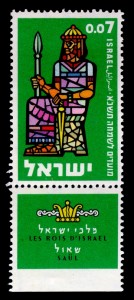
Saul is a unique case of a biblical king anointed three times. The first time he was anointed secretly by the prophet Samuel, some time later he was declared king publicly after being chosen from amongst the tribes. Yet, even at that public ritual he did not receive full public support. Opposing him were conniving men who expressed contempt for him. Saul definitive victory in the battle with the Ammonite won him sizeable support and admiration, followed by calls to denounce and kill those who plotted against the king. Saul had the wisdom to refuse that kind of vindictive action; Samuel, however, took advantage of that moment of victory and offered to “renew the kingship” ceremonially with huge public support and great jubilation.
Thus Saul, the first king of the Israelites, was declared king three times, twice in the presence of the people. However, the people did not choose him, nor did representatives of the people, Saul were chosen by God. Abarbanel raises the question, why would God take part in choosing kings? Why not leave the choice to the people themselves, as is the custom in most nations?
Abarbanel offers three possible answers:
1. To avoid divisions and disagreements, that in fact emerged later in the Kingdom of Israel, when disagreement on who should be the king to inherit Zimri led to a struggle between supporters of the two candidates (Kings 1, 16).
2. Recognition that people have limited judgment and would misjudge the character of the candidate, and have a hard time distinguishing good from bad.
3. A king elected by the people would feel an obligation and gratitude and would want to favor “his” people instead of pursuing justice for all. The king would feel most indebted to the powerful who helped make him king. However, a king chosen by God, would have no reason to judge with partiality, he would be bound by God’s command to judge justly.
Don Abarbanel was not only a distinguished Jewish commentator. He brought to his commentary unusual first -hand observations. In the 15th century he served as adviser first to the Portuguese king, and later to the Spanish royals, Ferdinand and Isabella. Being a close participant in royal politics gave him unique insights to the complexities and intrigues of kingship; it provided him with singular insights that he brought to his writings on kingship in Tanach, and to his interest in the Book of Kings.
Translated from the Hebrew by Ayala Emmett